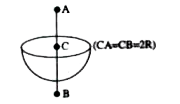Consider an over all neutral sphere of radius R. This sphere has a point charge +Q at its centre and this positive charge is surrounded by a uniform density ρ of negative charge upto a radius R. Use Gauss' law to obtain expressions for the electric field of this at a point distant r form its centre. where r < R. show that these two expressions give identical results for the elctric field at r = R.Solution in Punjabi
Step by step video & image solution for Consider an over all neutral sphere of radius R. This sphere has a point charge +Q at its centre and this positive charge is surrounded by a uniform density rho of negative charge upto a radius R. Use Gauss' law to obtain expressions for the electric field of this at a point distant r form its centre. where r < R. show that these two expressions give identical results for the elctric field at r = R. by Physics experts to help you in doubts & scoring excellent marks in Class 12 exams.
Updated on:21/07/2023Topper's Solved these Questions
Similar Questions
What is electriG flux ? Explain how the electric flux through a surface is related to electric field intensity, when the surface is heldinside the electric field.
View SolutionWhen is the force experienced by a current carrying conductor placed in a magnetic field, the largest?
View SolutionWhat is Huygen's principle?
View SolutionA sphere of radius R contains charge density rho(r )=A (R-r ) , for 0 lt r lt R . The total electric charge inside the sphere is Q. The electric field inside the sphere is
View SolutionA system consits of a uniformly charged sphere of radius R and a surrounding medium filled by a charge with the volume density rho=alpha/r , where alpha is a positive constant and r is the distance from the centre of the sphere. Find the charge of the sphere for which the electric field intensity E outside the sphere is independent of R.
View SolutionA sphere of radius R has a charge density sigma . The electric intensity at a point at a distance r from its centre is
View SolutionA sphere of radius R, is charged uniformly with total charge Q. Then correct statement for electric field is (r = distance from centre): -
View SolutionAn insulating solid sphere of the radius R is charged in a non - uniform manner such that the volume charge density ρ=Ar, where A is a positive constant and r is the distance from the centre. The potential difference between the centre and surface of the sphere is
View SolutionAn insulating solid sphere of the radius R is charged in a non - uniform manner such that the volume charge density ρ=Ar, where A is a positive constant and r is the distance from the centre. The potential difference between the centre and surface of the sphere is
View SolutionCharge density of a sphere of radius R is rho = rho_0/r where r is distance from centre of sphere.Total charge of sphere will be
View SolutionState Gauss 'law in electrostatics. Consider an overall neutral sphere of radius R. This sphere has a point charge +Q at its centre and this positive charge is surrounded by a uniform density rho of negative charges up to a radius R. Use Gauss, law to obtain expression for the electric field , of this sphere , at a point distant r, from its centre ,where r lt R, r gt R Show that these two expressions give identical results, for the electric field, at r= R.
View SolutionCharge density of a sphere of radius R is rho = rho_0/r where r is distance from centre of sphere.Total charge of sphere will be
View SolutionThe diagram shows a uniformly charged bemisphere of radius R. It has volume charge density ρ. If the electric field at a point 2R distance below its centre ?

View SolutionA system consits of a uniformly charged sphere of radius R and a surrounding medium filled by a charge with the volume density ρ=αr, where α is a positive constant and r is the distance from the centre of the sphere. Find the charge of the sphere for which the electric field intensity E outside the sphere is independent of R.
View SolutionA system consists of a uniformly charged sphere of radius R and a surrounding medium filled by a charge with the volume density rho=alpha/r , where alpha is a positive constant and r is the distance from the centre of the sphere. Find the charge of the sphere for which the electric field intensity E outside the sphere is independent of R.
View Solution
